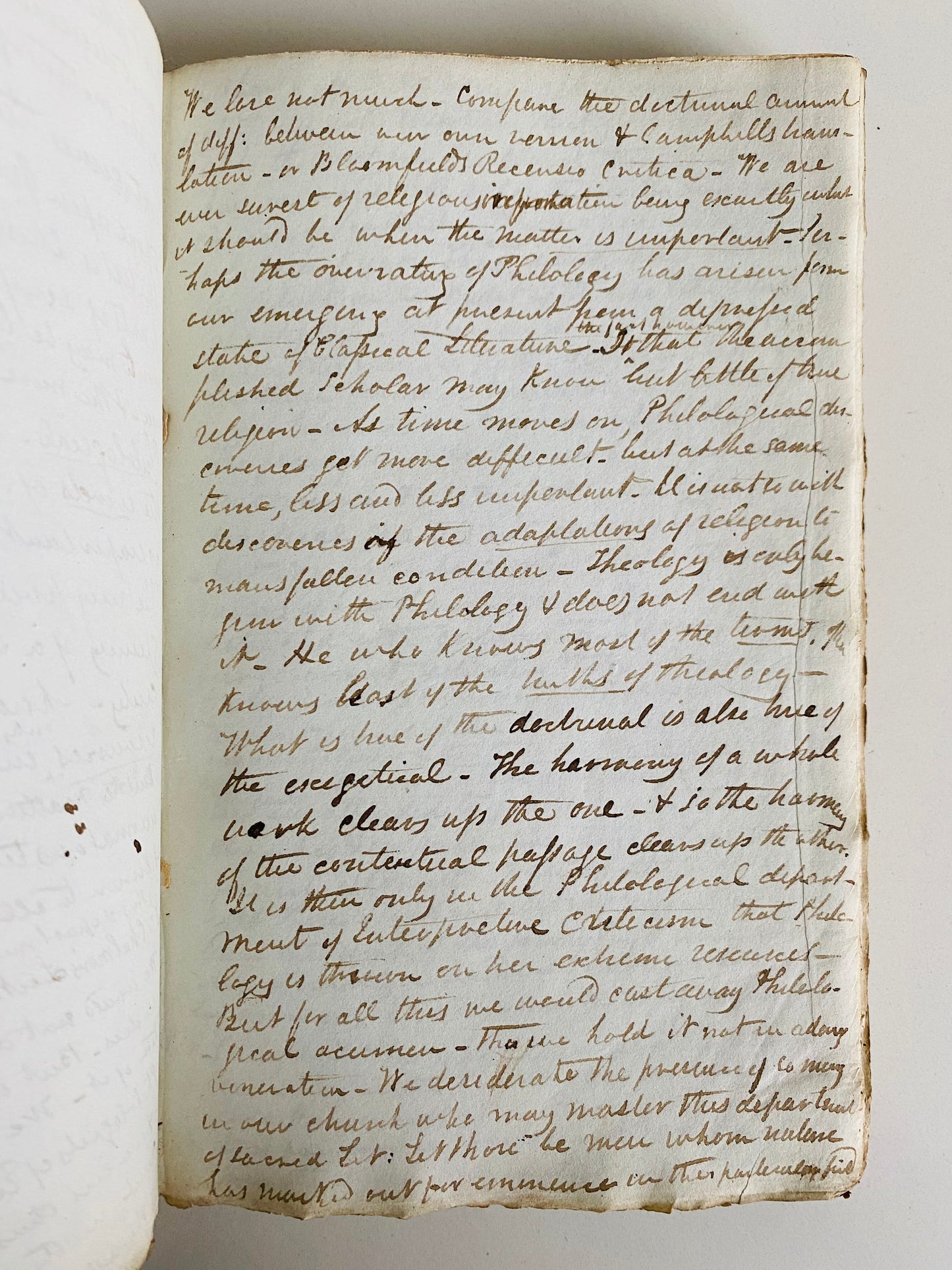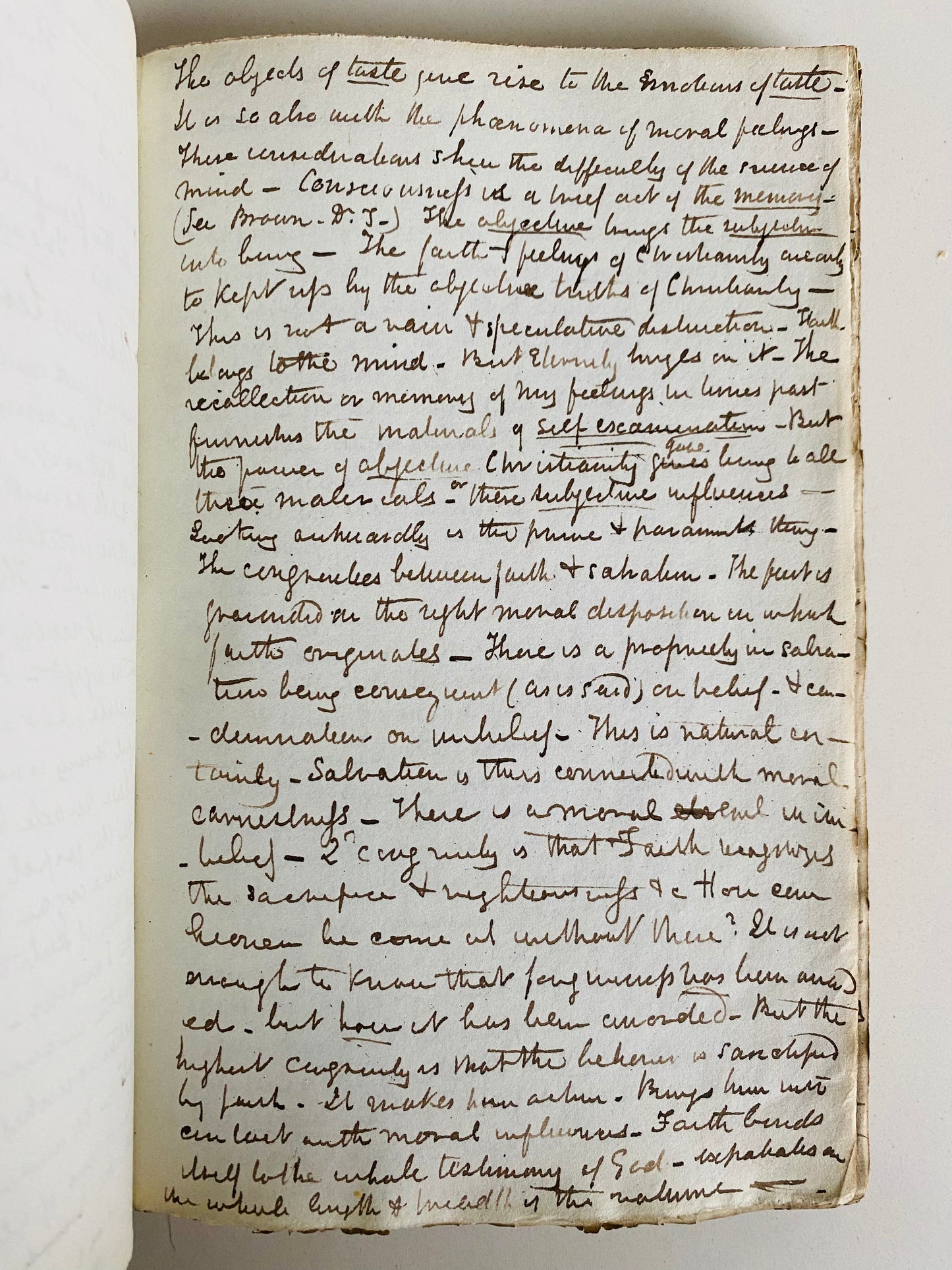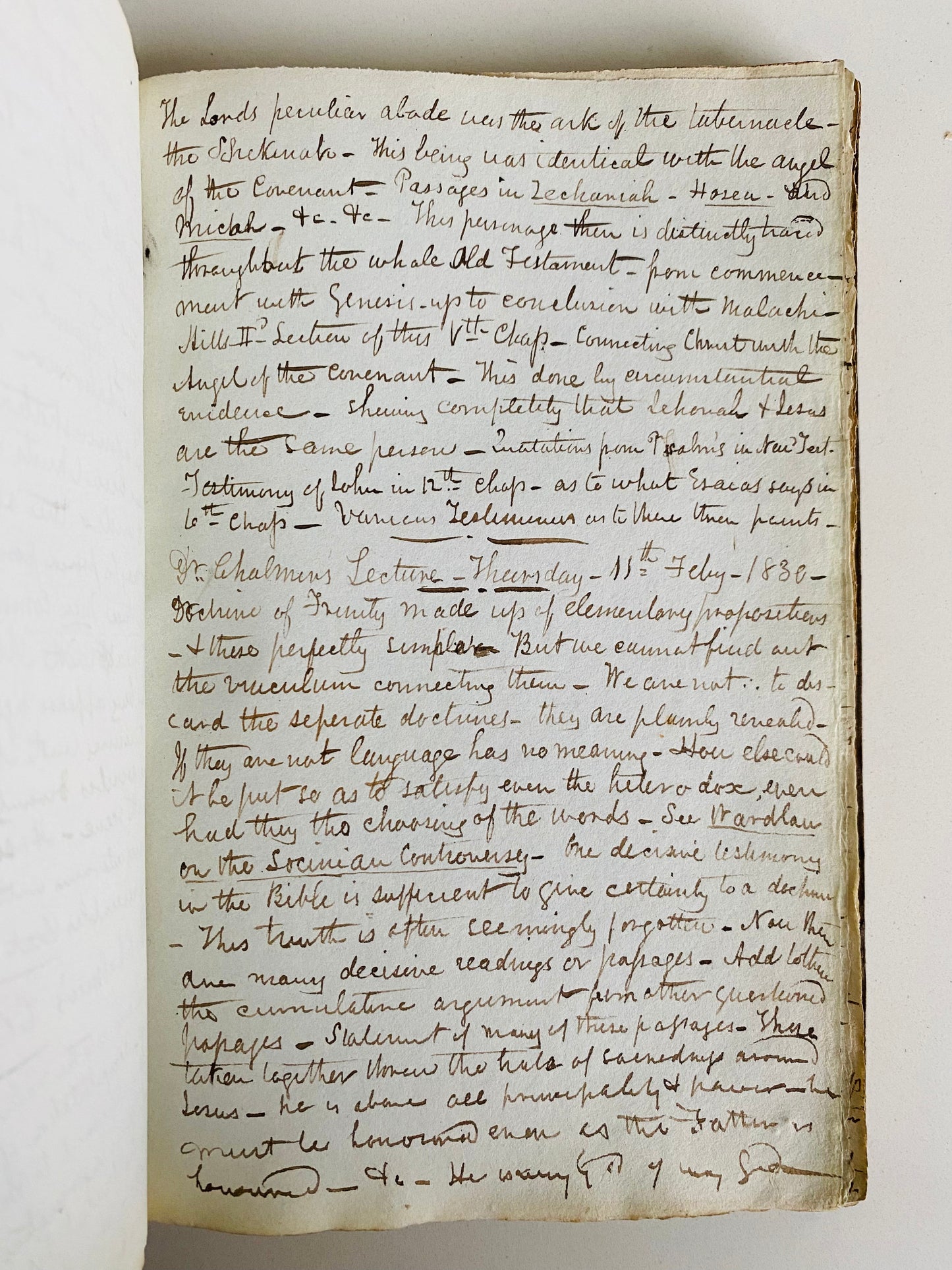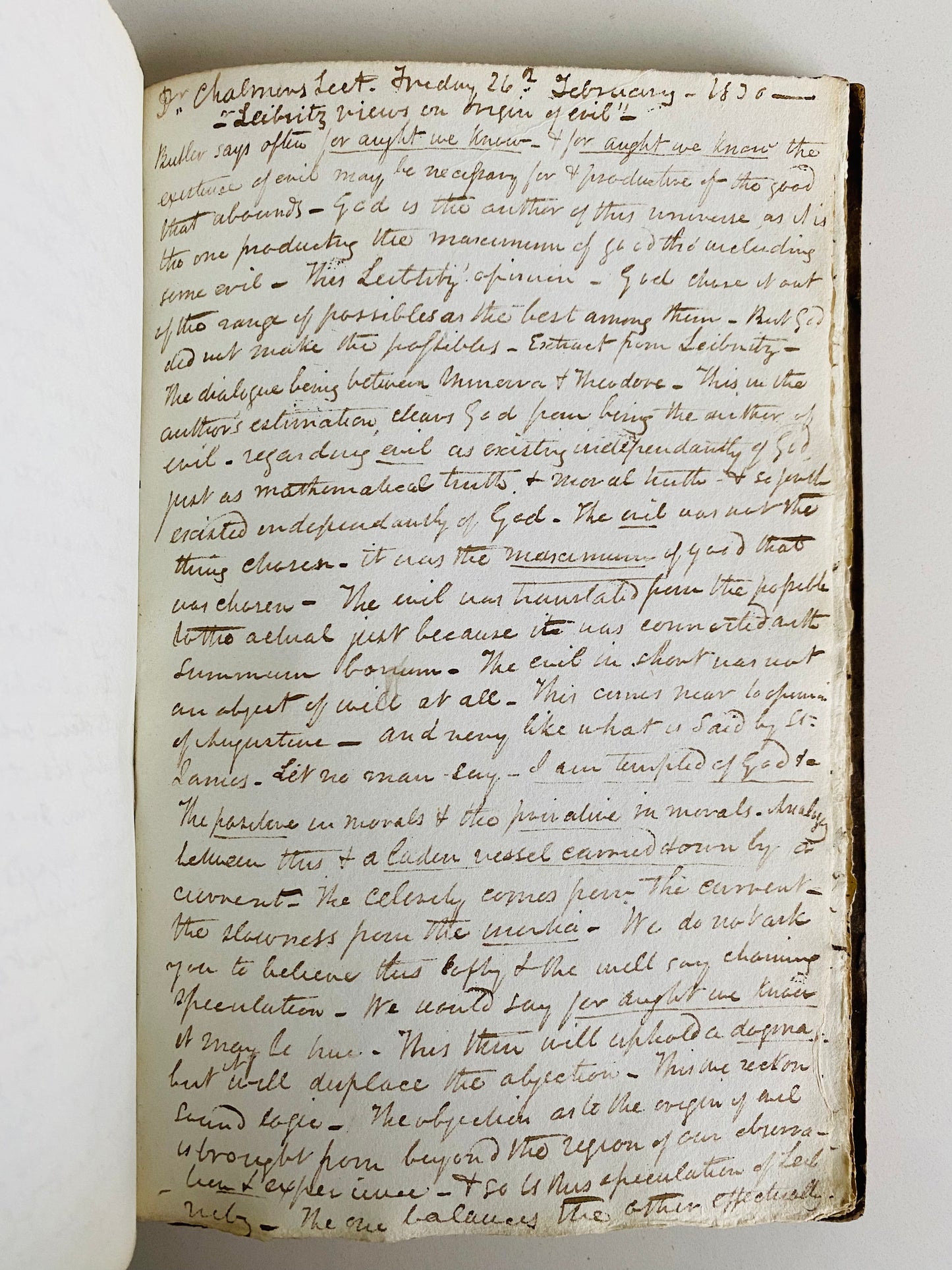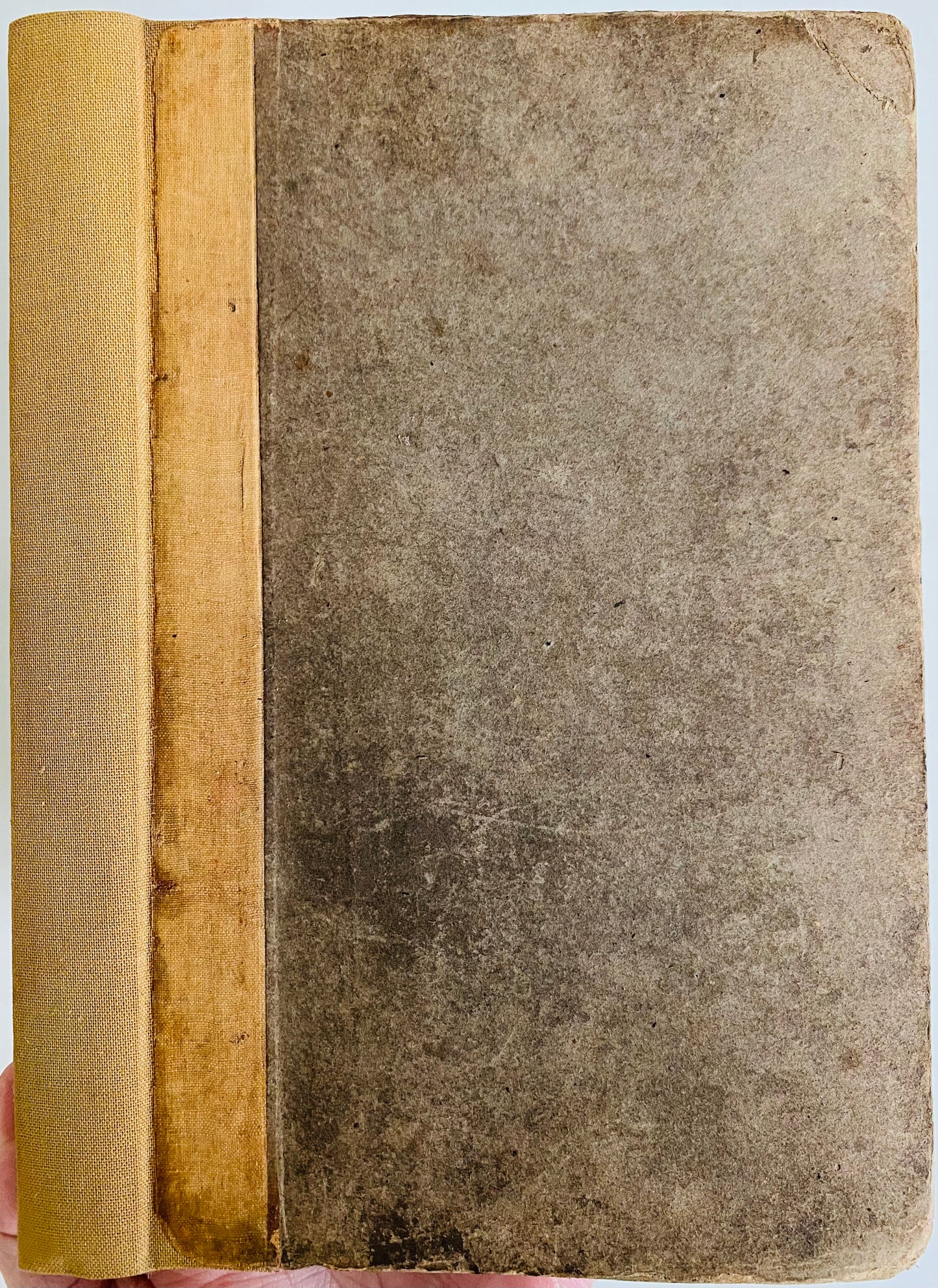Specs Fine Books
1829 THOMAS CHALMERS. 144pp Unpublished Manuscript on Theology and Philosophy.
1829 THOMAS CHALMERS. 144pp Unpublished Manuscript on Theology and Philosophy.
Couldn't load pickup availability
This is an absolute treasure and worthy of academic consideration and at least scholarly publication. This 144 page extensive manuscript, containing some 35,000 words, was kept by an undisclosed student of Chalmers at the Divinity School at the University of Edinburgh.
Thomas Chalmers [1780-1847] is one of the most fascinating and influential characters in 19th century Christianity. BY 1799, he was Ordained and already shaking things up. He openly charged the University of St. Andrews with substandard practices when it came to teaching Mathematics. He set about to teach them, along with Chemistry, himself. This was in addition to pastoring his first church at Kilmany.
In 1815, he was made pastor of Tron Church in Glasgow. It was vigorously opposed by the elite. Chalmers was too evangelical and too much the populist. While in Glasgow, he became one of the most famous preachers in England. Samuel Wilberforce, William's son, declared "all the world is wild about Dr. Chalmers!"
But Chalmers hadn't come to Glasgow only to preach or to develop a reputation as a preacher; he had come to set up the Kingdom. He established schools for the poor, developed a parish system to plant new churches around the city, and was determined to see Glasgow become a "City of God," preaching routinely on economic ethics, the dignity of work and the poor, etc.
By 1834 he was the head of the Evangelical wing of the Church of Scotland, an alliance that would not hold as he and 470 other ministers, many of whom he trained while professor at the University of Edinburgh, would go on to form the Free Church of Scotland during what came to be known as "The Great Disruption of 1843."
While at the University of Edinburgh, the list of names that counted him their spiritual father reads like a who's who of Scottish Evangelicalism. Andrew Bonar, Horatius Bonar, Robert Murray M'Cheyne, Edward Irving, and many others considered him their mentor and spiritual original.
Of particular interest to the present volume is a series of lectures dedicated to the work of the Spirit. Edward Irving, who had been trained by Chalmers and then served as Chalmers' associate pastor, was causing a sensation in both Scotland and at his National Scotch Church, Regent Square, where the charismata were being experienced. Prophecy, glossolalia, and the gift of healing were apparently in operation. And we can feel Chalmers in these lectures engaging that ongoing conversation. It is also evident, if this was Irving's teaching, where he might have formulated some of his original thoughts on the revival of the miraculous in the Church. While Chalmers, to our knowledge, was not of that persuasion, it is not difficult to take his lectures here and extend them in that direction.
The lectures range from November of 1829 through February of 1830 and appear to cover an entire course, since the opening page is labeled, "Introductory Lecture."
No similar example of Chalmers' classroom instruction to our knowledge has been preserved. Also unique, and we have many handled many volumes of "hearers" notes before, is the detail and thoroughness of these notes. They are no jottings, but undoubtedly fair representations of Chalmers' classroom lectures.
It should be remembered that many sermons we have published and preserved for us come from hearer's notes. They spoke more slowly and people were used to writing vast swaths of information quickly. There was no other option.
Themes range from Joseph Butler and Philosophy [Including Paley, Lardner, Bacon, Hume, Gibbon etc.], mentions of prophecy and enthusiasm [Irving is probably in the background here; though he discusses positively as well; miracles having an important epistemological function]; infidelity; Fenelon; Jeremy Taylor; Metaphysics; the importance of philosophy and its intersection with theology; the history and authenticity of Scripture; a discussion of John Newton's view [whereby the presence of the Spirit is verified by the change effected in God's people]; etc., etc. etc.
It is fascinating to read Chalmers, 190 years ago, not out of theological or philosophical naivety, but because of his understanding of theology and philosophy, leaning all the more profoundly in an experimental, Spirit-empowered and dependent proclamation of the Gospel. We feel this deep sense of Christ and dependence on the Spirit in his disciples; the Bonars, Haldanes, M'Cheyne, and many others involved in the Scottish revivals of the period.
More than one scholar has noted the impact of French philosophy on the deeply experimental nature of Scottish Evangelicalism in the early and mid-19th century. Even into Alexander Whyte, later in the 19th century, we continue to see its impact. Far from secularizing Chalmers, its observations, many of which he granted as true, made him all the more cognizant of the Church's need of the Spirit by which the immaterial becomes reality to the soul of the believer and the community.
A decade after the present lectures, Chalmers would publish his Sketches of Moral and Mental Philosophy. It would become a standard in Christian colleges for many years afterward. These are undoubtedly that works progenitor. He published, additionally, his exposition of Romans [which was highly commended by Spurgeon], works on geology's consistency with Scripture, the authenticity of Scripture, on Christian economics, epistemology, etc.,
6 x 9, 144 MSs pages in a neat, legible hand. A very solid, crisp copy.
As to the identity of the amanuensis, our only hint is that it is bound on paper produced in Bath. Someone could perhaps scour the records at the University of Edinburgh for record of who had come to the Divinity School from Bath in that year. It may provide insight.
Share
